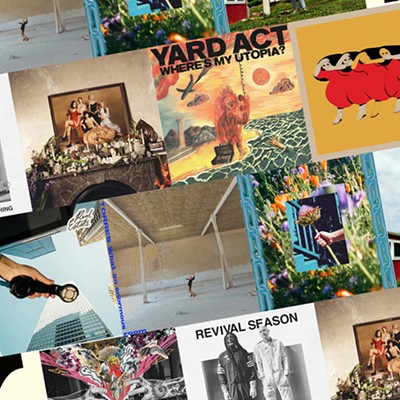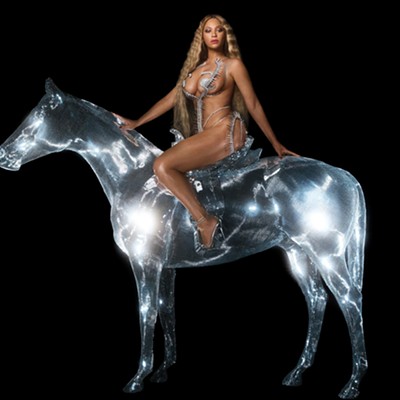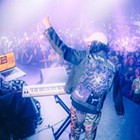What Swisha House did for Houston, what E-40 is doing for the Bay: This is what people hope will happen in Chicago. But even with the best producer in the world (Kanye) and the MC Jay-Z wishes he was (Common) among its alumni, Chicago cannot seem to unify itself. For a long time, America's rap congress was run on a two-party system -- West Coast, East Coast -- that was easy to stereotype and place on opposite ends of the sonic spectrum. From Tupac and Biggie to Game and Saigon, L.A. and NYC do seem to have an inexhaustible arsenal of once and future kings of rap. Though both are time-tested reservoirs of rap revolution, sometimes an audience needs a breath of fresh air. Sometimes it's time to diversify your bonds, bitches.
The public, though, seems to be in a third-party mood these days. People are open to experiencing the "alternative" sounds of the Dirty South and Yay Area (already longstanding hip-hop hotbeds) because these locales are offering something other areas, especially the coastal titans, are not: cultural solidarity and stylistic leadership. Paul Wall and Mike Jones sold Houston wholesale in monster memes: well-rounded cultural meals you can eat in three minutes. E-40 runs a similar distillery, boiling down an entire Bay's worth of yay into audio crack. The phrase "Chicago hip-hop," though, evokes no such specific sound, no singular accent, no clear identity. As yet, the essence of Chicago has yet to be bottled, yet to be captured in a rap capsule. And face it: For the public to take notice, things have to be easy to swallow.
Chicago is not yet ready for prime time or the mainstream. Still, what happens when the underground talent pool is deep, but a lightning rod cannot be found? What happens when a Dr. Dre or RZA or DJ Screw doesn't pop up to lead the way? What happens when a norm, a static style, a "signature sound" is never established? What happens when the rap identity of a city is so fractured it fits no clear artistic template? Well, then, the beauty is in the bevy, the magic in the myriad.
That isn't to say Chicago has no unity among its hip-hop artists. There is a general vibe to the most popular Chicago hip-hop. Many of Chicago's rap acts are on the same page concerning social consciousness and can be labeled (in a non-limiting way) as having a kind of Midwestern version of a Native Tongues sensibility. They also (and this is a necessary generalization) exhibit a shared affinity for hip-hop done for the right reasons, with stylistic ingenuity. Because of that, the city's sound is difficult to condense into a three-minute manifesto (i.e., E-40's Tell Me When To Go). The emphasis on originality, then, has prevented the birth of a Chicago Style.
That doesn't mean, though, that people are wrong to look to Chicago for tomorrow's underground talent. The city plays host to a few acts that independent radio DJs and Internet taste-makers are currently hyping, and even the largest stars from Chicago (Common and Kanye) have retained underground cred well after their mainstream crossovers.
Among the crop of rising stars are critical darlings Modill, a two-piece group (MC Racecar and producer/DJ K-Kruze) that gained shine from a rare appearance from Dave (of De La Soul) on their recent album, Midnight Green. K-Kruze's beats are of black-hole density, jam-packed with ideas, samples and more-is-more stews of sound. With a strong focus on intelligent playfulness, Racecar flows like MF Doom (if he wasn't so depressed), supplanting the latter's pitch-black humor with a helium levity that sounds absolutely welcome in today's world of kitsch and posture.
Another group that deserves attention from Chicago's underground is the recently formed Coppershot, a super-group (in the DangerDoom sense) of two (relative) unknowns: Copperpot and Longshot. Copperpot is a producer and DJ who made some underground waves with a little CD he threw together called Chapter Seven in 2002. The disc was noticed due to the guest appearances (Edo.G, Pace Won, Mr. Complex, Diverse), but eventually praised just as highly for its backdrops. He's now teamed up with Longshot, a rhymer of great potential.
Longshot showed on previous albums, Open Mouths Fed, for example, that he has the right ideas, takes his time with a pen and cares about making his delivery engaging. He's also notable for having made one of the only attempts to actually unify the Chi. His Civil War mix tape contained music from a ton of Chi artists (including Modill) and was considered a genuine stab at orchestrating what might one day be called a local movement. It was an inspirational feat.
It's especially noteworthy that Longshot didn't really wait to get famous before he tried to support a large group of hip-hoppers: He got put on and immediately reached out to everyone he knew who was trying to make good rap music. His team-up with Copperpot, on Coppershot's Issues, is right up there with Modill's Midnight Green -- not only for best Chicago rap album, but for best rap album in the country so far this year.
So there's hope for Chicago becoming a cohesive scene, but rap like this challenges the very idea of such scenes. Is continuity even necessary when there's this much quality? Yes and no.
Modill and Longshot at the Blvd. with Speech and Tre Hardson on Friday, April 14, at 10 pm. Tickets: $10. Visit ticketswest.com or call 325-SEAT.















